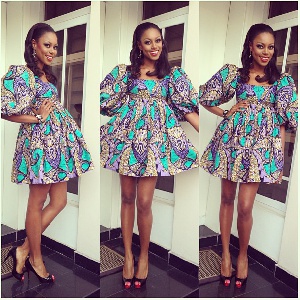When was the last time you wore a dress/cloth made in Ghana? If you are in Ghana, chances are that at least once a week, you wear a dress made in Ghana, either on Sunday or on Friday!
Cloth or dress sewn in Ghana is perhaps, the one local product that every Ghanaian is proud to be associated with. Call it African-wear, but these are purely styles sewn in Ghana by Ghanaians. I wonder why we call them African-wear, but the use of these exquisite locally made colourful clothes surpass fashion circles.
It is amazing to see business executives elegantly wear their Ghanaian styles in beautiful styles even in the conventional and formal corporate sphere. While the origination of the term ‘African wear’ is still not clear, in Ghana it refers to any attire sewn from African fabric (regardless of style).
Thanks to Ghana’s versatile fashion designers and artisans, there are now bags, shoes, belts, hats and purses all made in Ghana from Ghanaian/African fabric. Be it Woodin, Daviva, GTP, ATL or Batique, Ghanaian designers are able to come up with nice designs that showcase African creativity.
According to Pearl Afi Heto, an Accra based Fashion Designer and Principal Stylist at Pearlix African Styles, African or Ghanaian fabric is trendy because it can be sewn into many designs. There is an African-wear design for every occasion, and anyone can order for one regardless of body size or personal budget. African-wear can be worn beautifully to parties, wedding ceremonies, Church service, dinner and conferences just to mention a few.
This is a complete departure from the trend many years ago when there were only a few Ghanaian styles; Kabba, Slit and Jumpa, being the most popular. Many people prefer to have their own African design sewn for them rather than buy already designed cloths/dress (ready-made) from a boutique. This is because African/Ghana fabric is pretty flexible to use.
One fabric can be sewn into many designs and clients are at liberty to indicate exactly the design they wish to have. These are not just limited but pre-ordered custom made designs.
Customized designs are unique to the individual, and patrons can describe to designers exactly the kind of fabric and design they desire. This notwithstanding, Pearl Afi Heto, of Pearlix African styles bemoaned the over duplication and pirating of African-wear design patterns.
According to her, local designers usually do not seek legal protection (Copy-right) or even properly name their designs. As a result of this, once in a while a particular design may be in vogue because many designers replicate it without regard to the ‘original owner’ of the design, and no one may even refer to the design by a name, it is only identified through description.
‘Once people see you in a nice dress, they quickly arrange with another designer to sew the same or a similar design, this does not encourage creativity’, Pearl explained when I caught up with her at her Gicel Estate, Weija (SCC) Office.
The local fashion industry is still budding, and Ghana has seen some consistent and established designers on local fashion horizon stepping into international spotlight. One sure way to support the industry is to reward the effort of the many fashion designers and street corner tailor shops that produce the beautiful African designs we admire and wear.
It goes without saying that Ghanaian and African fashion designers must also properly structure and position their businesses to take advantage of opportunities available on the local and international fashion landscape.
Fashion of Monday, 20 April 2015
Source: ghanavibes.com













